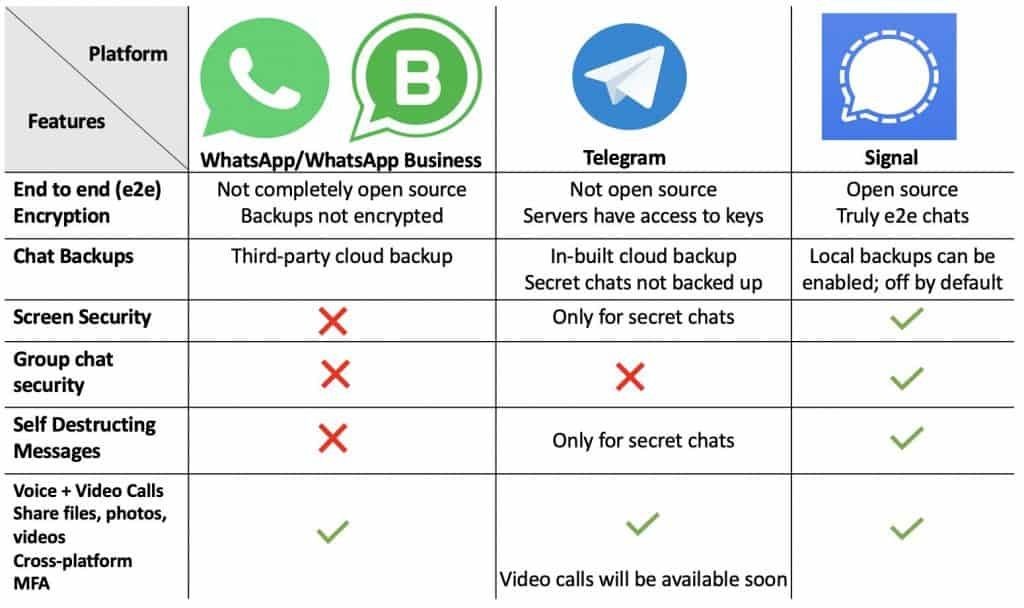

In the world of instant messaging apps, security and privacy have become paramount concerns for users worldwide. Let’s learn more about this topic below with Word Search as we dive deep into comparing two popular messaging platforms: Telegram and WhatsApp.
Both Telegram and WhatsApp are prominent messaging applications that offer end-to-end encryption, though they implement it differently. WhatsApp automatically encrypts all messages, while Telegram offers encryption as an optional feature through its Secret Chats. This fundamental difference sets the stage for our security comparison.
WhatsApp, owned by Meta (formerly Facebook), has been around since 2009 and boasts over 2 billion active users. The platform offers a straightforward messaging experience with features like voice calls, video calls, and file sharing. Telegram, launched in 2013, has grown significantly, offering similar features but with additional emphasis on large group conversations and channels.
WhatsApp uses the Signal Protocol for end-to-end encryption, which is widely regarded as one of the most secure encryption protocols available. This means that all messages, calls, and media shared through WhatsApp are automatically encrypted, and only the sender and recipient can access the content. The platform doesn’t store messages on its servers once they’re delivered.
Telegram, on the other hand, uses its proprietary MTProto encryption protocol. While regular chats in Telegram are encrypted between the client and server, they’re stored on Telegram’s distributed servers. The platform’s Secret Chats feature provides end-to-end encryption, but users must manually enable this feature for each conversation they want to keep private.
Read more: Best Messaging Apps for Privacy in 2025
WhatsApp collects certain user data, including phone numbers, contact lists, and usage information. The app’s privacy policy has faced scrutiny, particularly after Meta’s acquisition, with concerns about data sharing between WhatsApp and other Meta-owned platforms. Users can control who sees their profile picture, status, and last seen timestamp.
Telegram offers more granular privacy controls. Users can hide their phone numbers from others, use usernames instead of phone numbers for identification, and control who can add them to groups. The platform claims to collect minimal user data and has a strong stance against sharing user information with third parties.
Telegram excels in features that enhance user experience and security. The platform offers self-destructing messages, the ability to edit sent messages, and superior file sharing capabilities with a 2GB file size limit. Users can also create large groups with up to 200,000 members and channels for broadcasting messages to unlimited audiences.
WhatsApp focuses on simplicity and reliability. While it has a more limited feature set, it offers essential security features like two-step verification, encrypted backups, and disappearing messages. The platform recently increased its file sharing limit to 2GB and improved group chat capabilities, though still not matching Telegram’s scale.
Telegram operates on a distributed server network across multiple jurisdictions, which enhances security by making it harder for any single entity to access user data. The platform’s cloud-based architecture allows users to access their messages across multiple devices simultaneously, though this comes at the cost of not having default end-to-end encryption for regular chats.
WhatsApp uses a more traditional server infrastructure, with end-to-end encryption ensuring that messages can only be accessed on authorized devices. The platform recently introduced multi-device support, though it’s more limited compared to Telegram’s implementation.
Both platforms have faced security challenges. WhatsApp has experienced vulnerabilities that potentially allowed attackers to inject spyware through voice calls, though these were quickly patched. The platform’s connection to Meta raises concerns about potential data sharing and privacy implications.
Telegram’s main security concern is its use of a custom encryption protocol instead of widely-tested standards. While no major breaches have been reported, some security experts express skepticism about the platform’s proprietary encryption method. Additionally, the lack of default end-to-end encryption for regular chats remains a point of criticism.
Telegram offers users more control over their data and communication preferences. The platform allows users to delete messages for all participants without time limitations, create anonymous accounts, and maintain separate secret chats. The company is also known for its transparency regarding government requests for information.
WhatsApp provides less flexibility in terms of user control. While users can delete messages within a specific timeframe, they have limited options for anonymous usage and must share their phone numbers with contacts. However, the platform is transparent about its security measures and regularly updates users about security improvements.
Both apps handle system resources differently. WhatsApp generally consumes less battery power due to its simpler feature set and straightforward encryption implementation. The app’s performance is consistent across different devices and network conditions.
Telegram’s feature-rich nature and cloud-based architecture can lead to higher battery consumption, particularly when using features like Secret Chats or handling large files. However, the platform’s efficient code optimization helps maintain reasonable performance levels.
Read more: Forest App Review: Can It Help You Stay Focused?
When it comes to security, both Telegram and WhatsApp have their strengths and weaknesses. WhatsApp offers stronger default security through universal end-to-end encryption but provides less user control and raises concerns about data sharing with Meta. Telegram offers more features and user control but requires manual activation of end-to-end encryption for maximum security.
For users prioritizing absolute message security, WhatsApp’s default end-to-end encryption makes it a solid choice. However, for those seeking more features, better privacy controls, and willing to manually manage security settings, Telegram provides a more versatile platform. The best choice ultimately depends on individual needs, privacy concerns, and how the app will be used.
Consider using both apps for different purposes: WhatsApp for private, sensitive communications where automatic encryption is crucial, and Telegram for feature-rich group communications and content sharing where additional privacy controls are desired. Always stay updated with the latest security features and privacy policies of both platforms to make informed decisions about your digital communication needs.